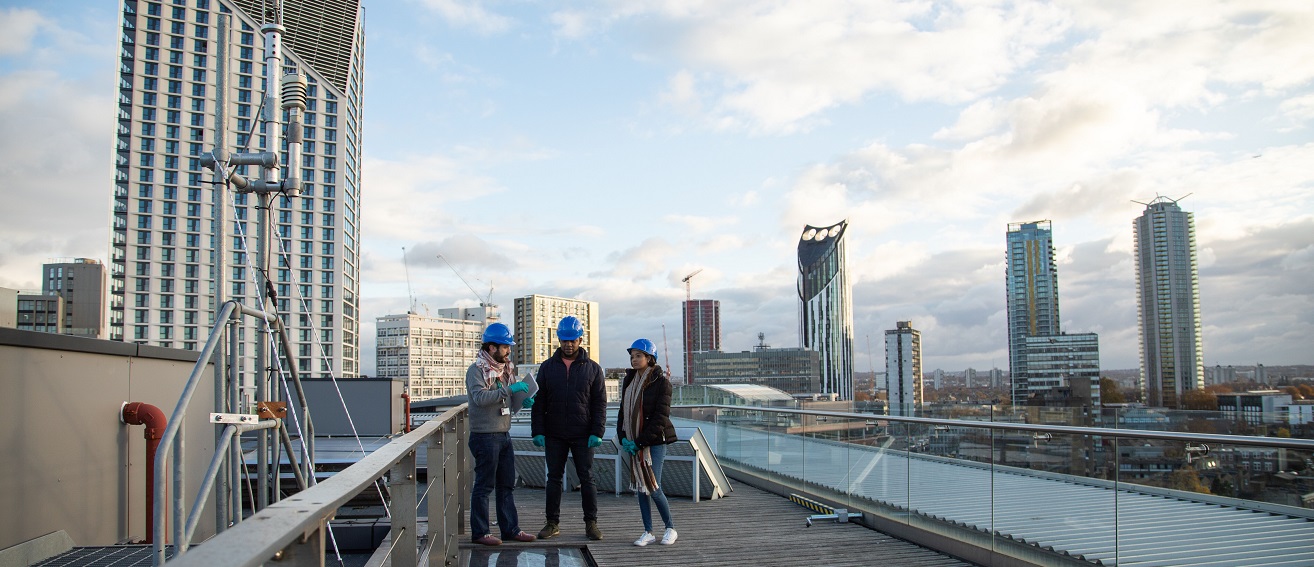Overview
An integral role
The Civil Engineering Apprenticeship includes a degree qualification in Civil Engineering BEng (Hons) and a qualification leading towards Chartered Civil Engineer status.
Civil engineers provide technical and management input to develop design solutions for complex civil engineering problems. They work as part of a team of engineers and other construction professionals through the development, design, construction, commissioning, operation, and maintenance, of civil engineering infrastructure.
Current student Kimaya Patel talks about her experience studying with us! Kimaya is an Engineering & Manufacturing finalist for The Multicultural Apprenticeship Awards 2023 in partnership with Pearson.
The apprenticeship provides a broad skills base, making our graduates eligible for work in areas including sustainable construction, structural integrity, geotechnics (engineering behaviour of earth materials), materials, tunnelling, marine and coastal engineering, water, waste management, flood management, transportation and power.
A civil engineer may work in either public or private sector organisations, including local authorities, central government departments and agencies, engineering consultancy practices, contracting Òrms and research and development organisations
Civil engineering is all about designing, building and maintaining things that can change the world. Roads, bridges, canals, dams and buildings have all played an integral role in how the human race has developed. LSBU is keen to provide a sustainable approach to modern civil engineering satisfying the current requirements of both companies and society.
The full apprenticeship standard and assessment plan can be found on the IfA website.
Apprenticeship Employment Guidelines
Apprenticeship Evidence Pack Guidance
Why Civil Engineering at LSBU?
- star
Ranked 3rd for teaching quality in the UK (Sunday Times Good University Guide 2020).
- check-circle
- Decades of accreditation by the Engineering Council, carried out by the Joint Board of Moderators, as fully satisfying the educational base for an Incorporated Engineer (IEng).
- power-off
- The teaching team is active in research and/or consultancy work, and there are frequent industrial expert visits. The broad field of Civil Engineering disciplines is fully covered by the academics team.
- external-link-square
- Some modules include field work and site visits.
| ModeApprenticeship | DurationUp to 60 Months Practical Period & 18 Months EPA (78 months) | Start dateSeptember | Application code5123 | Application method Direct to LSBU |
Watch our video to see how you can make yourself at home studying at LSBU.
Location
London South Bank University student union is located at 103 Borough Rd, London SE1 0AA.
If you are visiting our Southwark Campus, you may wish to use our downloadable campus map (PNG File 466 KB). For information on accessibility, see our DisabledGo access guides. See our location page for more details.
Entry Level Requirements
Need further information? Call us on 0800 923 8888 to discuss entry requirements.
- A Level BBC - Must include Mathematics and preferably a Science in either Chemistry or Physics (UCAS points: 112)
- T-level (Merit or above) in Construction: Design, Surveying And Planning. (UCAS points: 120)
- BTEC Level 3 Extended Diploma DDM in an Engineering subject area, with a minimum of merit in Mathematics and Further Mathematics. (UCAS
- points: 128)
- BTEC Level 3 National Diploma D*D* in an Engineering subject area, with a minimum of merit in Mathematics and Further Mathematics. (UCAS points: 112)
- Civil Engineering Technician level 3 apprenticeship DD (UCAS points: 96) alongside grade Pass or Distinction at EPA
- If you have any of the above qualifications but don't meet the criteria, or any other technical qualifications awarded with UCAS points at a similar level, please get in contact with the LSBU Apprenticeships at apprenticeships@lsbu.ac.uk for Apprenticeships Routes.
- Applicants must hold 5 GCSEs A-C including Maths and English or equivalent (reformed GCSEs grade 4 or above).
Our employer pages provide information about who can be an apprentice, the steps to offering an apprenticeship and the employer commitment.
Choose your country
Select country here:
Missing English and Maths qualifications?
If you do not have the required English and Maths qualifications needed to satisfy the entry requirements for this programme, we have courses available at our partner College that you can take to upskill in these areas. Find out more at South Bank College.
Funding
The cost of the apprenticeship is paid fully by the employer (sometimes part funded by the government) through apprenticeship levy. The apprenticeship levy is a pot of money some companies pay into, which all businesses have access to spend on the training costs of apprenticeships. Companies fall into two categories: levy-payers (who pay into the pot) and non-levy payers (who do not). You can find out more in our Levy and Funding section, specifically for employers
The apprentice does not contribute toward the cost of study.
Bands
Apprenticeship standards are all assigned a funding band by the Government – these funding bands are the maximum amount the Government will fund via the levy towards a given apprenticeship standard. There are currently 30 funding bands ranging from £1,000 to £27,000.
Incentives
Employers with less than 50 staff sending an apprentice aged 16-18 will have 100% of the training costs paid by the government. All employers who employ an apprentice aged 16-18 on the first day of teaching will receive a £1,000 incentive from the government. You can find out more in our Levy and Funding section, specifically for employers.
Cost
You can find out the funding band for an Apprenticeship Standard on the Government website. To find out how much we are charging, please get in touch with us at apprenticeships@lsbu.ac.uk
Field trips
Some modules include field work and site visits. There may be field trips organised which may be residential or outside the United Kingdom, ranging from three to five days. These are organised by the Division and students may be required to contribute towards the cost. If outside the UK, students will be advised of any visa or passport requirements.
Home and International entry
| Mode Apprenticeship | Duration Up to 60 Months Practical Period & 18 Months EPA (78 months) | Start date September | Application code 5123 | Application method Direct to LSBU |
An Apprenticeship Standard is comprised of a programme of study, an End Point Assessment and on-the-job learning. This means that in addition to meeting academic requirements, you’ll need to be employed in a role related to your apprenticeship. The process of applying depends on whether you have an employer to sponsor (and support) you.
If you are employed and your employer has confirmed they will support your apprenticeship:
You are welcome to submit an application via our application system. You’ll need to provide details of your employment/employer as part of the application. You’ll also need to ensure you and your employer meet the requirements – find out who can be an apprentice to see if you meet the entry requirements and employer commitments to find out more about your employer’s role.
If you are not employed:
- You will need to find a job role related to the apprenticeship you wish to apply for, with an employer who is happy to support you. If you would like to find an employer to support your apprenticeship with LSBU, you can search which employers are currently advertising Apprenticeships via the National Apprenticeship Service website searching for ‘London South Bank University’ as keywords.
- If there are no search results, this means there are currently no vacancies. We update our vacancies regularly, so please do check back regularly.
- Many employers advertise their apprenticeship vacancies on their websites or via other portals. You could search for ‘find an apprenticeship’ online.
- When you’re ready to apply, see the government's advice on how to write a winning apprenticeship application and make your application.
Further information for apprentices
If you’re a prospective apprentice, you can find out more about who can be an apprentice on our student pages.
Further information for employers
If you’re an employer, you can find information about the employer commitments and further related information on the related pages for business.
See our admissions policy 1.5 MB and complaints policy 516.0 KB.
Prepare to start
There are steps the apprentices, the employer and the University need to complete before you start your course. Take a look at the steps to be completed in the Enrolment section. Employers may also like to look at our steps to offering an apprenticeship.
You'll study theory and practice relating to the many diverse areas of civil engineering. You’ll have an active role in a blend of lectures combined with laboratory, workshop and computer-based sessions.
Year 1 (Level 4)
- Mathematics A
This module consolidates the mathematical skills that underpin the BEng degrees. It's specifically designed to cater for the wide differences in mathematical background of first year students to reach an equivalent A-level maths and then extending it by introducing the main mathematical techniques that are required in the early stages of engineering degrees. Assessment methods: 50% coursework, 50% exam. - Construction practice C
This module aims to provide you with the knowledge of the interrelationships between industry, professional bodies and education, and an understanding of key professional and research requirements. It will provide you with a roadmap for your professional career, and will enable you to prepare for employment in the construction discipline. Assessment method: 100% coursework. - Materials and geology A
This module will introduce you to the properties and applications of a variety of engineering materials, including some innovative materials. In addition, it will introduce you to engineering geology and geomaterials (rock and soils). Whilst traditional lectures and laboratories will be used as a means of delivering the course content, there will also be emphasis on the teaching in the field through site visits. Assessment methods: 50% coursework, 50% exam.
Year 2 (Level 4)
- Fluid Mechanics A
This module teaches fundamental principles of fluid mechanics, and their practical applications. The student will be able to understand the fundamental principles of fluid mechanics relating to hydrostatic and hydrodynamic forces, sediment transport, measurement of pressure, the stability of floating bodies, coastal and flood engineering, air flow around structures and flow in simple pipes and open channels. The student will perform fluid flow laboratory tests, workshops and prepare reports and presentations. Assessment Methods: 50% Coursework, 50% Exam. - Engineering surveying
This module will introduce you to the basic theory and practice of land surveying, particularly as it applies to civil engineering. You'll learn or revise the main concepts of three-dimensional geometry and relate them to practical surveying exercises. You'll be taught to use various pieces of surveying equipment, including tape, level, theodolite and total station. You'll learn how measurements are taken and booked, and how to carry out various relevant computations, including the assessment of error and the calculation of reduced level, coordinates and bearings. You'll use the knowledge you've acquired to carry out a field project. This project will involve tape and offset survey, levelling, traversing and calculation of volume. In addition you'll learn to carry out simple setting out procedures, including the analysis and setting out of curves, and you'll be introduced to the concepts of GPS and its associated technology. You'll learn the associated surveying calculations, adjustment and analysis of survey observations. Finally, you'll gain an appreciation of the need for a quality management process/system in undertaking practical work. Assessment methods: 50% coursework, 50% exam. - Structures and construction technology A
This module will teach you the fundamentals of structural mechanics and strength of material, and you'll use numerous worked examples to complement your understanding. You'll be introduced to a computer aided analysis package. You'll reinforce your understanding of structural concepts by studying some well known historical failures. Finally, you'll develop introductory principles of structural engineering design though open-ended exercises and case studies. Assessment methods: 50% coursework, 50% exam.
Year 3 (Level 5)
- BIM and Design
In this module, you'll be introduced to the principles of collaborative work through Building Information Modelling (BIM). The module will build up on AutoCAD and construction technology knowledge, and will teach you 3D modelling of buildings in Autodesk Revit. You'll model typical multi-storey framed steel and concrete buildings and the appropriate variable actions applied on their floors. You'll learn about load take-down methods to transfer the load from the floors onto the primary and secondary beams and columns. These beams and columns will be designed in Robot Structural Analysis program and the results compared to hand calculations taught in the Design of Elements A module. Assessment method: 100% coursework. - Design of elements A
In this module you'll learn to design steel and concrete structural elements and steel connections according to the Eurocodes. Assessment methods: 30% coursework, 70% exam. - Structures and construction management A
This module will further develop the analysis of determinate and indeterminate beams and frames that was introduced at Level 4. It will also introduce the preliminary design and construction of framed buildings and civil engineering structures, including Construction Design and Management and Project Management aspects. Assessment methods: 30% coursework, 70% exam. - Hydraulics
This module develops the fundamental principles introduced in the Level 4 module Engineering Mechanics A and applies them to practical applications of analysis and design in open channels and pipe flow. You'll develop a greater understanding of the flow of ideal and real fluids and will apply these principles to the analysis and design of open channels and pipes. You'll perform open channel flow laboratory tests and prepare a formal report. Assessment methods: 30% coursework, 70% exam.
Year 4 (Level 5&6)
- Advanced mathematics
This module covers intermediate undergraduate engineering mathematics, providing an introduction to the numerical and statistical methods underlying many tools, including Finite Element and Finite Difference Methods, as well as linear regression and probability distributions. Assessment methods: 30% coursework, 70% exam. - Soil mechanics
This module will introduce the theory related to soil properties and their measurement, and will presents a number of simple models that are used to describe soil and its mechanical behaviour. Standard laboratory tests will be carried out, and the results will be analysed to determine the soil properties. Assessment methods: 30% coursework, 70% exam. - Structures and design A
This module builds on the previous studies of structures and design. It will cover various analytical and design methods for beams, frames, connections and slabs. Also included will be an introduction to finite element modelling. Assessment methods: 30% coursework, 70% exam. - Group design project A
This module is designed to involve you in the process of engineering project development, from planning to detailed design, working with a project team. Assessment method: 100% coursework.
Year 5 (Level 6)
- Individual research project A
The Individual Research Project involves the individual investigation of a specific area of civil engineering or a closely related discipline. The project should be of a research and investigative nature. Assessment method: 100% coursework. - Highway engineering A
This module covers highways and junctions classification, principles of traffic flow, traffic analysis, transport modelling and planning, transport safety, and junction design and analysis. Also covered are the highway geometrical design and the highway structural design, including design traffic loading and materials in addition to related environmental and sustainability issues. Assessment methods: 40% coursework, 60% exam. - Geotechnical engineering
This module shows how the soil mechanics theories introduced in Soil Mechanics are applied to the solution of a number of geotechnical analysis and design problems. Assessment methods: 30% coursework, 70% exam. - Environmental engineering and professional development
This module takes the principles of environmental engineering and applies them to practical applications of analysis and design. You'll be introduced to the principles of water quality, and basic water and wastewater treatment processes, and you'll consider sustainability issues. You'll develop an understanding of the surface hydrology, and apply these principles to the calculation of precipitation and unit hydrograph. You'll also learn basics of groundwater flow, and the problem of contamination in groundwater, air pollution and noise pollution. This module will provide you with the professional development, attributes and other requirements needed for a position of responsibility that will be achieved during the "Initial Professional Development" at the workplace. Assessment methods: 30% coursework, 70% exam.
Careers
Employability Service
By completing the apprenticeship route, you’ll have the advantage of having real-world work experience, working in a role related to your area of study. This will give you a competitive edge among other graduates when you complete your apprenticeship standard.
During your studies – and for two years after you graduate – you’ll have access to our Employability Service, who can help you develop your skills through the Careers Gym workshops and presentations. Our JobShop advisers support students and graduates with finding the right job for them.
We are University of the Year for Graduate Employment - The Times and Sunday Times Good University Guide 2018.
Benefits of the apprenticeship standard route
By studying the apprenticeship route, you gain real world work experience from the start of your course combined with a better understanding and analysis of your daily tasks, building skills and contacts, giving you an edge on graduation.
Roles of a Civil Engineer
Civil engineers deliver a vital service in ensuring the safe, well-resourced construction of a huge range of projects in the built and natural environment, from transport networks to Olympic stadia.
The careers opportunities available to graduates of civil engineering are very diverse: water engineer involved in dams and sea defences; highways engineer involved in designing and building road networks; structural engineers for either, amongst others, built environment or bridges; and many more!
Diversification into management, engineering research or professions that value a numerical degree such as accountancy or banking are also possible. Wherever an economy is strong there is an increase in demand for professionally qualified civil engineers, so overseas travel is possible.
What to expect from your career
Regardless of what is being built, civil engineers typically undertake site surveys and feasibility studies, analysing the risks of a project and coming up with designs to meet the challenges. They work with engineers and scientists from a wide range of backgrounds, assembling the right team of contractors for the job and overseeing their work as the build begins. Additionally, they manage budgets and ensure that all relevant legal requirements of the new construction are met.
They provide progress reports to their clients and play a crucial central role throughout the project until the building is finished. At that point, a Civil Engineer often draws up and hands over protocols for the maintenance and servicing of the construction.
Graduate success stories
Recent graduates have gone onto roles in structural, water, public health, transportation and geotechnical branches of the civil engineering and building industry, working for consultants, contractors and government authorities.
Continuing to postgraduate studies
If you graduate from this course, you will be able to apply for further study at postgraduate level, including for a place on our full-time or part-time MSc Civil Engineering or MSc Structural Engineering.
Graduates from this course are also accepted for a wide range of MSc research degrees in engineering and also for MBA programmes. The course is accredited and you can gain Chartered Engineer status through further accredited learning at postgraduate level.
The on-the-job part of your apprenticeship will give you the opportunity to work and network with other professionals in the industry.
Civil Engineering courses have been taught at LSBU for several decades and our alumni occupy senior positions throughout the world. Their feedback, combined with our Industrial Advisory Panel, keep our courses up-to-date with the needs of international employers. The course is particularly strong in its structural and geotechnical engineering content and recently students have won national competitions for their structural design work.
CEIAB (Civil Engineering Industrial Advisory Board)
Our industrial partners help our academic staff to maintain a balance between academic requirements and up-to-date industrial practice with regular meetings and visits to their companies.
Professional accreditation
This degree is accredited by the Joint Board of Moderators (JBM) comprising the Institution of Civil Engineers, Institution of Structural Engineers, Institute of Highway Engineers, and the Chartered Institution of Highways and Transportation on behalf of the Engineering Council as:
- fully satisfying the educational base for an Incorporated Engineer (IEng).
- partially satisfying the educational base for a Chartered Engineer (CEng).
A programme of accredited Further Learning will be required to complete the educational base for CEng.
See the JBM website for further information and details of Further Learning programmes for CEng.

- The Institution of Civil Engineers is a qualifying body, a centre for the exchange of specialist knowledge, and a provider of resources to encourage innovation and excellence in the profession.

- The Chartered Institution of Highways and Transportation is concerned specifically with planning, design, construction, maintenance and operation of land-based transport systems and infrastructure. It has 12,000 members.

- The Institution of Structural Engineers is the world's leading professional body for qualifications and standards in structural engineering. It has 27,000 members in 105 countries.

- The Institute of Highway Engineers (formerly the Institute of Highway Incorporated Engineers) is the professional institution for practitioners in highway and traffic engineering offering Engineering Council registration and professional development support.
Field trips
Some modules include field work and site visits, which may be residential or outside the United Kingdom, ranging from three to five days. These are organised by the Division and students may be required to make a contribution towards the cost. If outside the UK, students will be advised of any visa or passport requirements.
One day visits to construction sites and other installations are arranged on a regular basis. See some of our recent site visits.
Teaching and Assessment
Five years of winning prizes in national structural design competitions against other universities is further testimony to the strength of the teaching team. Everyone teaching is also active in research and/or consultancy work, which together with input from visiting industrial experts keeps the course up to date for the industry requirements.
BEng programme
As a BEng programme, this course encourages you to acquire a deeper understanding of the essential facts, concepts, theories and principles of civil engineering and the science and mathematics which underpin it. Many recruiters will look favourably on BEng graduates for this reason.
Apprenticeship structure
The Apprenticeship Standard is comprised of on the job learning, as well as both structured and self-directed study.
Duration
The duration of the apprenticeship is up to 6 years.
Learning on-the-job
Comprised of on the job learning in a relevant job role as well as structured and independent learning, the apprenticeship route is a way to learn both theory and practice alongside each other.
Delivery
Part time day release: apprentices attend university once a week for two semesters. Semester 1 runs from September to January and semester 2 from January to June.
Assessment
Assessment of the academic element of this apprenticeship will consist of course work, exams and timed assessments. There will be formal lectures, study guides, course notes, directed reading, class tutorials, assignments, small group projects, workshops and laboratories.
Note: outside of term-time apprentices must maintain 20% of their time on off-the-job training. The Government website provides further information and examples about off the job training can be
Gateway
Before undertaking the End Point Assessment, you will provide evidence of satisfactory completion of all aspects of the apprenticeship programme: accredited civil engineering degree, employer agreed formal training plan and CPD records; level 2 Maths and English; employer confirmation and request for end point assessment.
End Point Assessment
The End Point Assessment is the final stage of your apprenticeship programme. During the EPA you will demonstrate your acquired competence and skills during your professional career whilst undertaking your degree. This is the reason for the EPA being a professional assessment rather than an academic one.
It is comprised of: a written report (4500 to 5000 words) prior to a presentation and structured interview supported by a written exam (3 questions related to industry knowledge relevant to the apprenticeship standard).
People profiles

Register your interest
Apprentice Guide
Download our guideContact information
Course Enquiries - UK
Tel: 0207 815 7500


